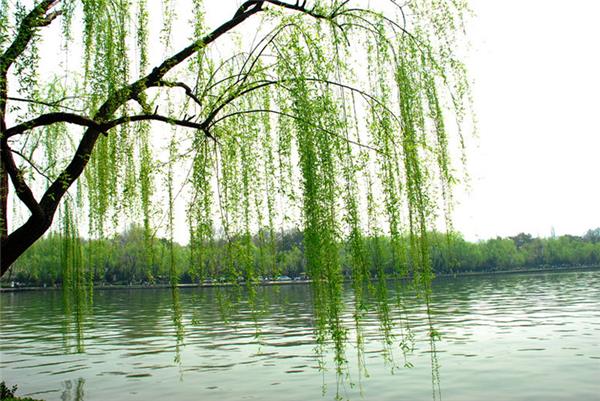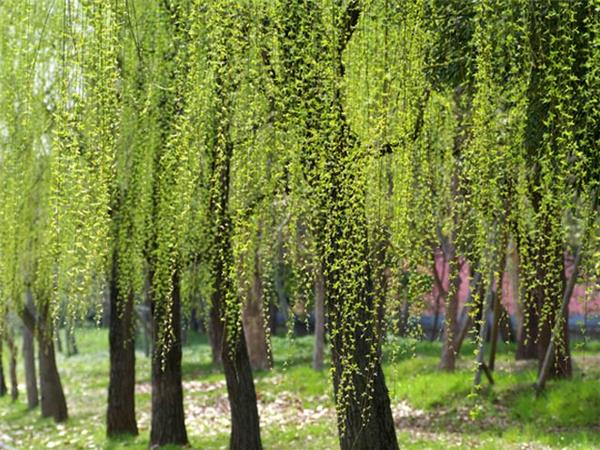How to repair the wound of weeping willow
Weeping willow can beautify our living environment, but to ensure that it can play the greatest role, when breeding weeping willow, we must take corresponding protective measures on the basis of understanding the growth habits of weeping willow. In order to ensure the healthy and healthy growth of weeping willow.

Matters needing attention in weeping willow culture
1. Generally speaking, timely irrigation can provide effective guarantee for the rapid growth of willow to a certain extent. Usually, irrigation is mainly divided into two times, the first time is immediately after the completion of weeping willow planting, irrigation should be carried out immediately to ensure that the soil is closely combined with weeping willow seedlings, and in the second irrigation, must be based on the actual needs of seedlings, only in this way, can we harvest a better irrigation effect.
two。 In the process of growth, willow seedlings are more vulnerable to golden flower insects, weevil and aphids, so disease and pest control must be carried out regularly, on the one hand, it can ensure the healthy growth of weeping willow, on the other hand, it can shorten the growth cycle of weeping willow, so that weeping willow can grow quickly.
3. Generally speaking, during the growth period of weeping willow, some nitrogen fertilizers such as ammonium sulfate and urea should be applied properly, and some potassium fertilizers such as calcium superphosphate and plant ash should be applied properly in the later stage of seedling growth.
4. After completing the cultivation of weeping willow, we must do a good job of post-treatment and weed regularly to ensure adequate nutrients for weeping willow growth.

How to prune the weeping willow
Planting and pruning: when planting annual seedlings, the roots and branches should be pruned properly, and the planting time should be from defoliation in winter to before leaf bud sprouting in February. Once the main root is too long, it is easy to nest root when planting, which is not conducive to the growth of the root system. Generally, the main root and lateral root are cut and retained 3~6cm, and the fibrous root is best retained in order to form a developed root system. For the delicate and delicate plants of the trunk, it is necessary to bind the trunk with a bamboo pole, cut off the slender tip, leave the main bud, pay attention to wipe the bud, and cultivate the upright trunk step by step.
Seedling shaping: pruning the seedlings during cultivation to maintain proper branching points and plump crowns. According to the growth potential of the seedlings, 1-2 plates of branches should be cut off from the trunk from the bottom up every year before the leaf buds germinate, so as to gradually increase the branching point of the seedlings, and the height of the stem should be 3-3.5m. Weeping willow can not be treated by intensity pruning, because the cross-section of the wound is easy to rot in the presence of water, which will cause the decline of the tree.
Transplanting and pruning out of the nursery: weeping willow is a deciduous tree species, which should be transplanted from defoliation in winter to before bud sprouting, and the survival rate is high. When the seedlings come out of the nursery and transplant, the main branches should be cut moderately, the strength should not be too high, and the cross-sectional wounds should be immediately coated with preservatives. Mainly thinning branches, because weeping willow has strong branching ability, so thinning pruning capacity can be larger.

Third, different treatment and repair methods of weeping willow.
1. For the treatment of the wound on the trunk, first scrape and flatten the four sides with a sharp knife, so that the edge of the cortex is curved, then disinfect it with medicament (2% to 5% cupric sulfate solution, 0.1% liter mercury solution, stone sulfur mixture solution), and then apply the protective agent. The protective agent should be easy to smear, have good adhesion, do not melt when heated, do not penetrate Rain Water, and do not corrode the tree tissue. Generally, lead oil is better. Such as the use of hormone coating is more beneficial to wound healing.
two。 The white painting of the trunk is also one of the important protection measures of the tree. The aim is to control diseases and insect pests and delay tree sprouting so as to avoid sunburn. The composition of the whitening agent is generally as follows: 10 parts of water, 3 parts of quicklime, 0.5 parts of stone-sulfur agent, 0.5 parts of salt and a little adhesive in order to prolong the whitening period of weeping willow.
3. To repair a tree hole that cannot be healed for a long time, we can nail a lath on the surface of the hole and seal it with putty and sesame knife ash; then apply white latex, pigment powder, and finally press the bark grain or nail a piece of real bark on it to make the appearance more natural.

As one of the most common landscape tree species, weeping willow is closely related to our urban greening construction, which can effectively purify the urban air and beautify the urban environment, so it is also a soldier to defend the health of the city.
- Prev

How to cultivate Robinia pseudoacacia and how to control its diseases and insect pests
How to cultivate Robinia pseudoacacia and how to control its diseases and insect pests
- Next

Matters needing attention in the cultivation of alpinia officinalis how to raise alpinia officinalis
Matters needing attention in the cultivation of alpinia officinalis how to raise alpinia officinalis
Related
- Wuhan Hospital Iron Tree Blooming Result Was Instantly Frightened by the Gardener Master
- Which variety of camellia is the most fragrant and best? Which one do you like best?
- What is the small blue coat, the breeding methods and matters needing attention of the succulent plant
- Dormancy time and maintenance management of succulent plants during dormancy
- Minas succulent how to raise, Minas succulent plant pictures
- What are the varieties of winter succulent plants
- How to raise succulent plants in twelve rolls? let's take a look at some experience of breeding twelve rolls.
- Attention should be paid to water control for succulent plants during dormant period (winter and summer)
- Watering experience of twelve rolls of succulent plants
- Techniques for fertilizing succulent plants. An article will let you know how to fertilize succulent plants.

